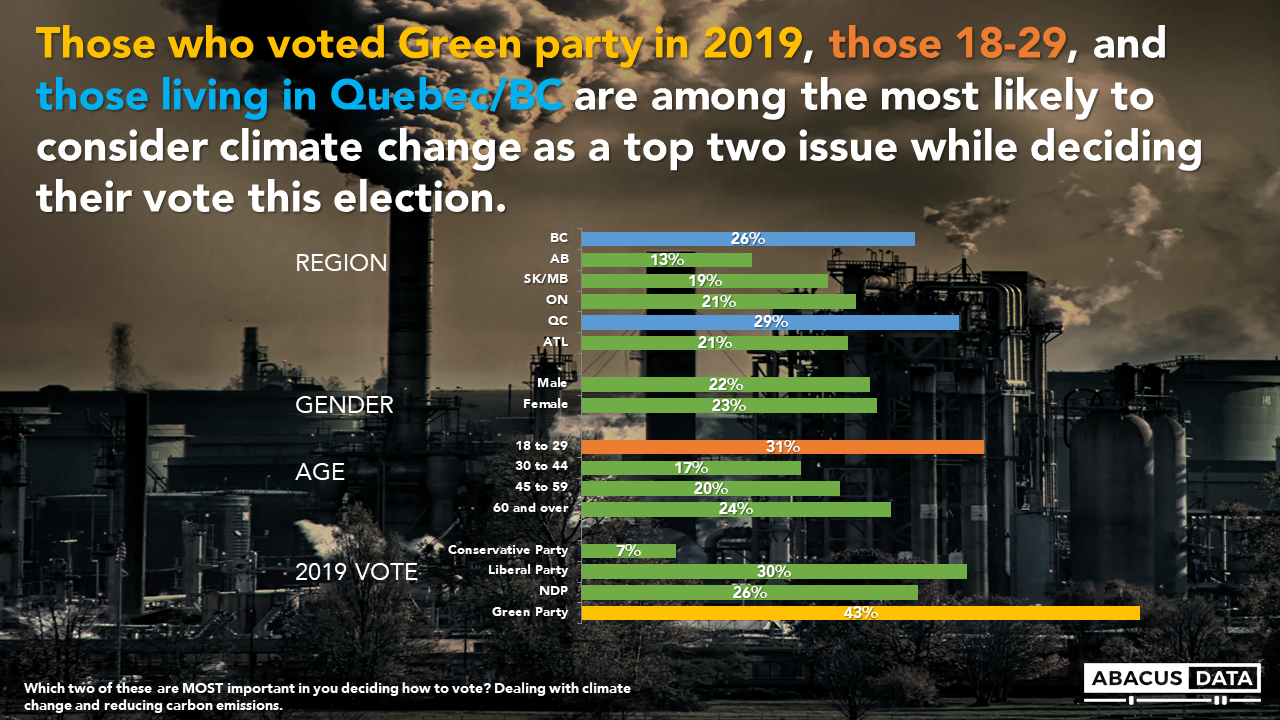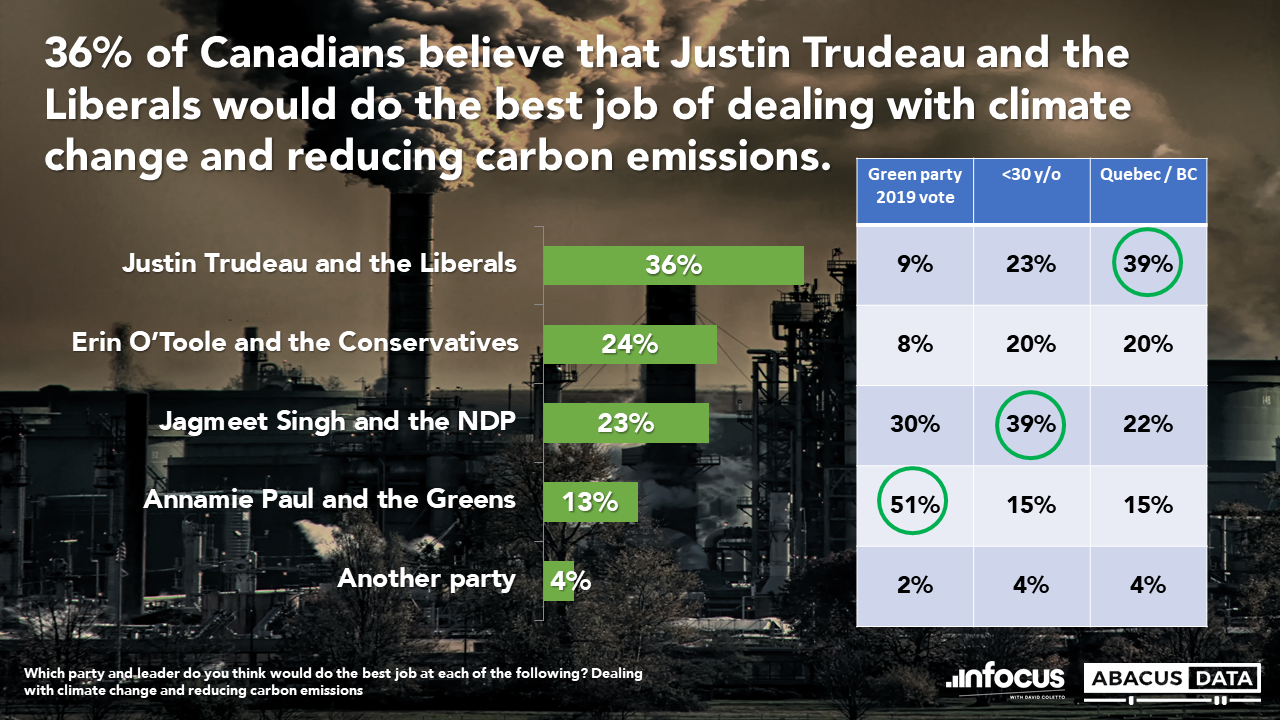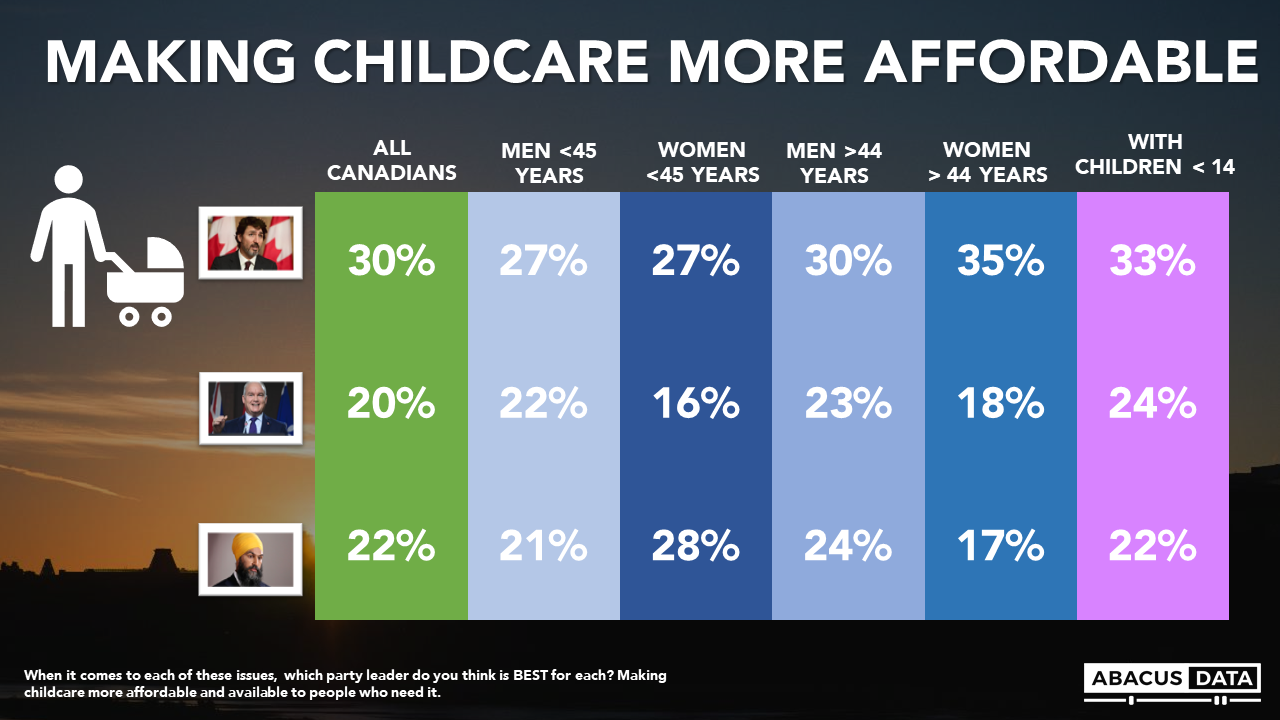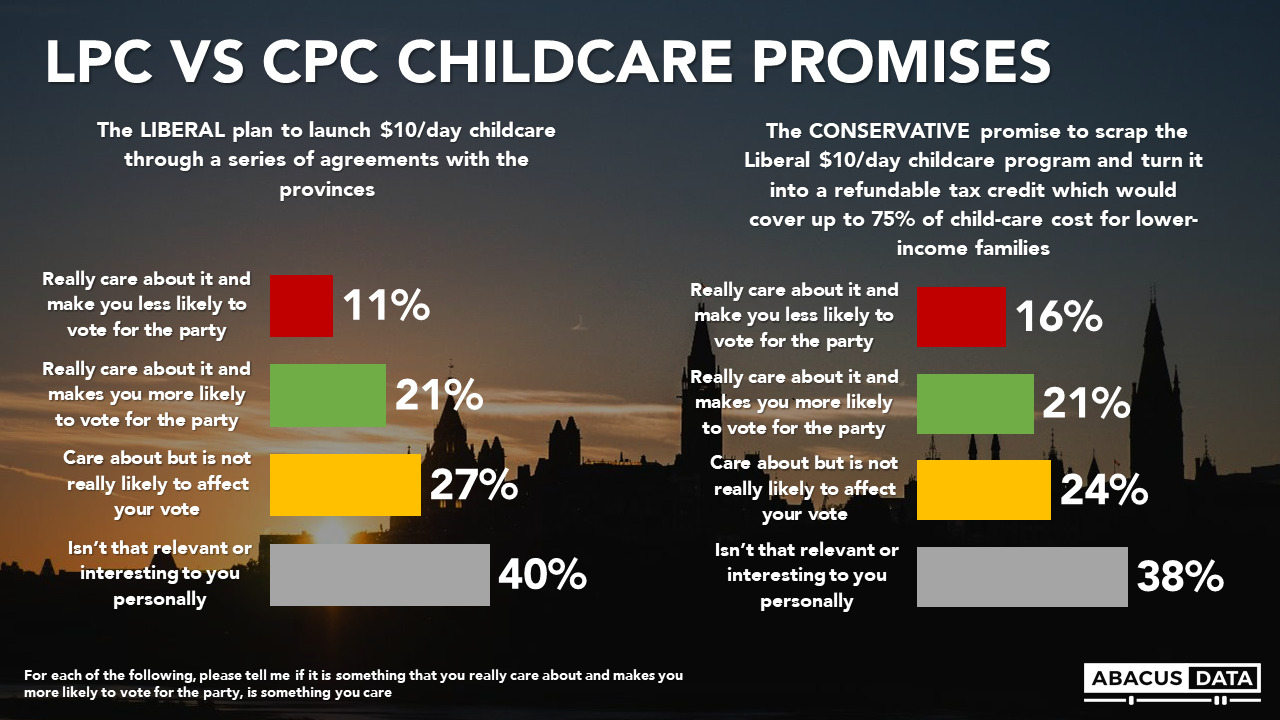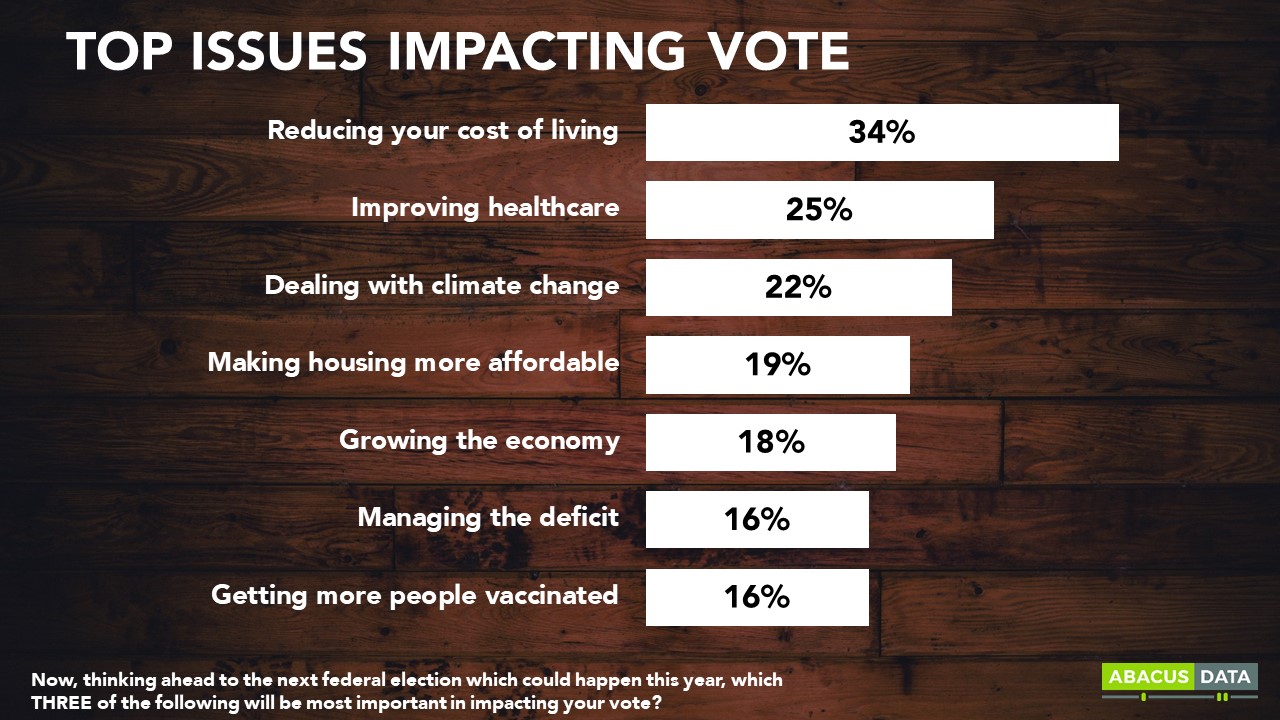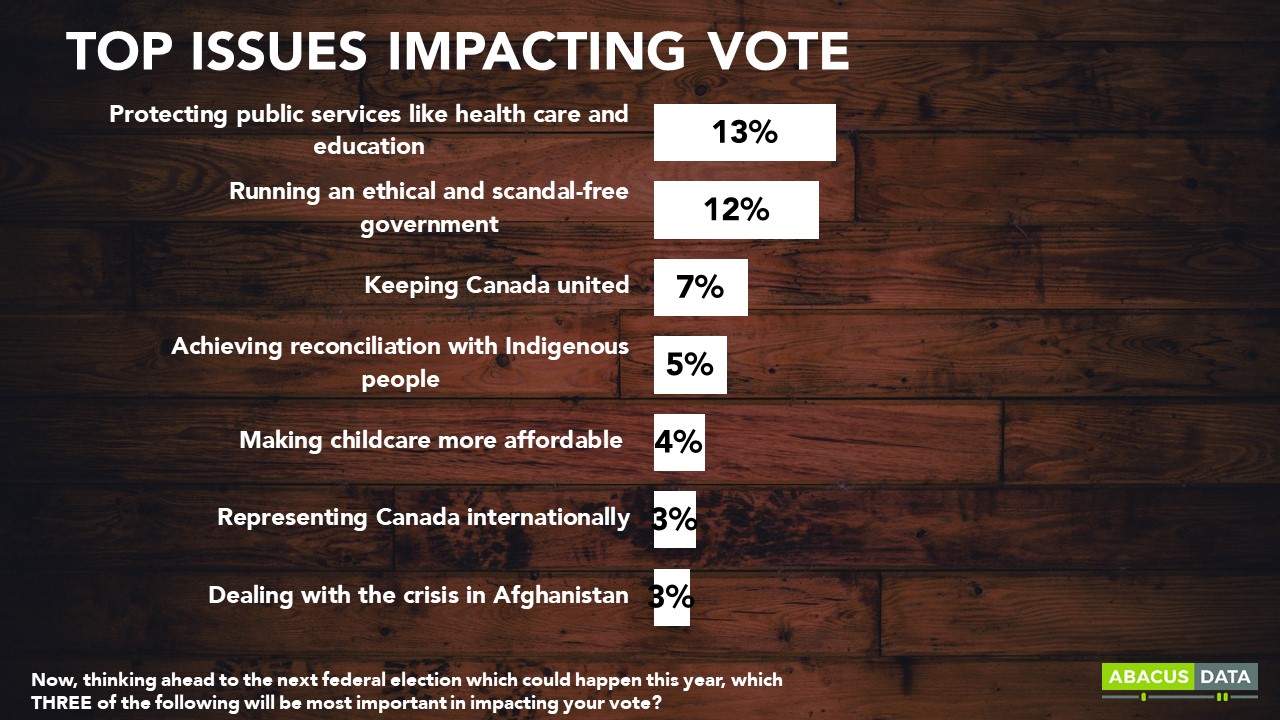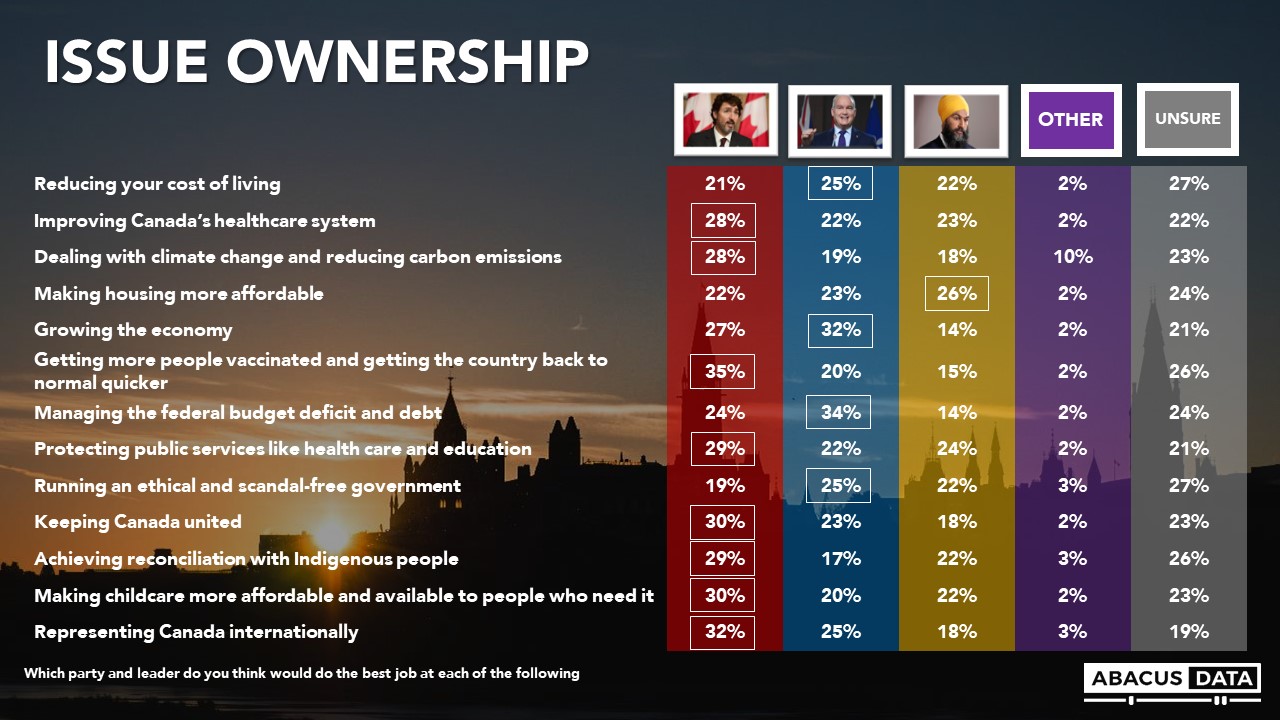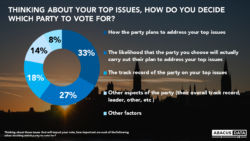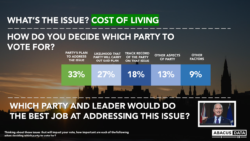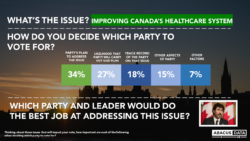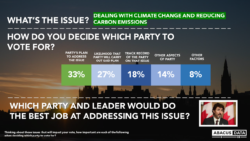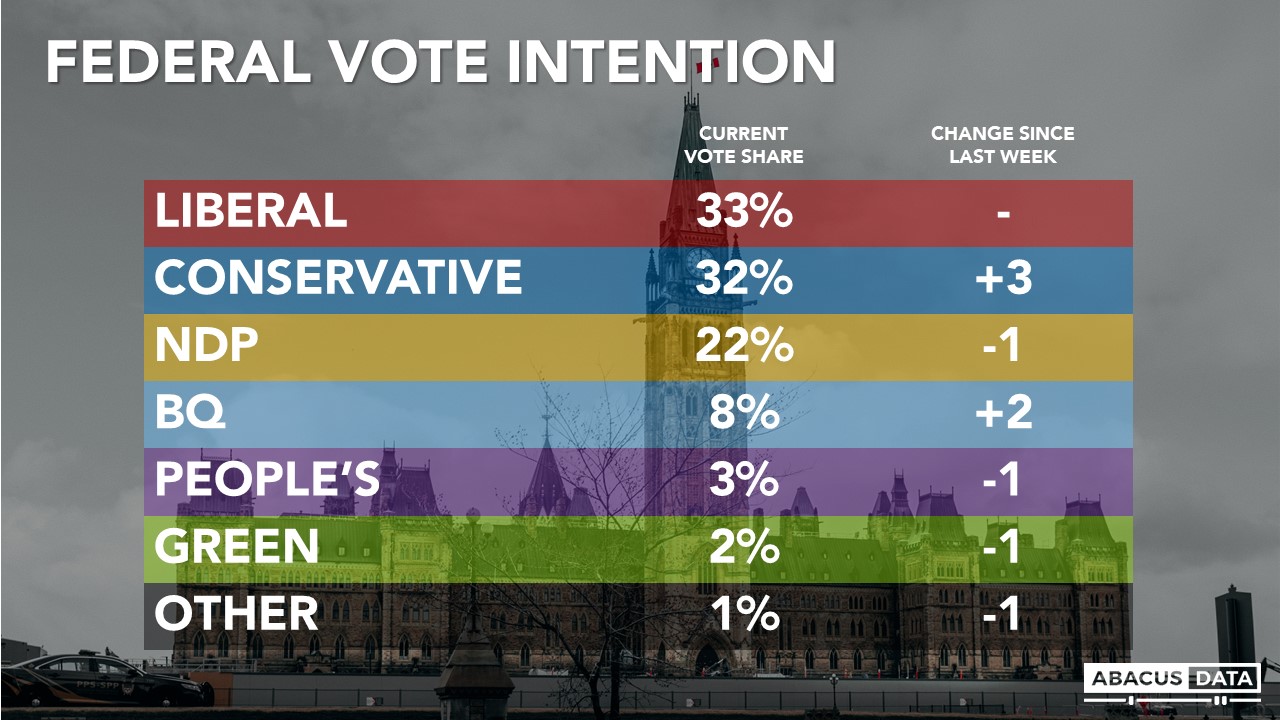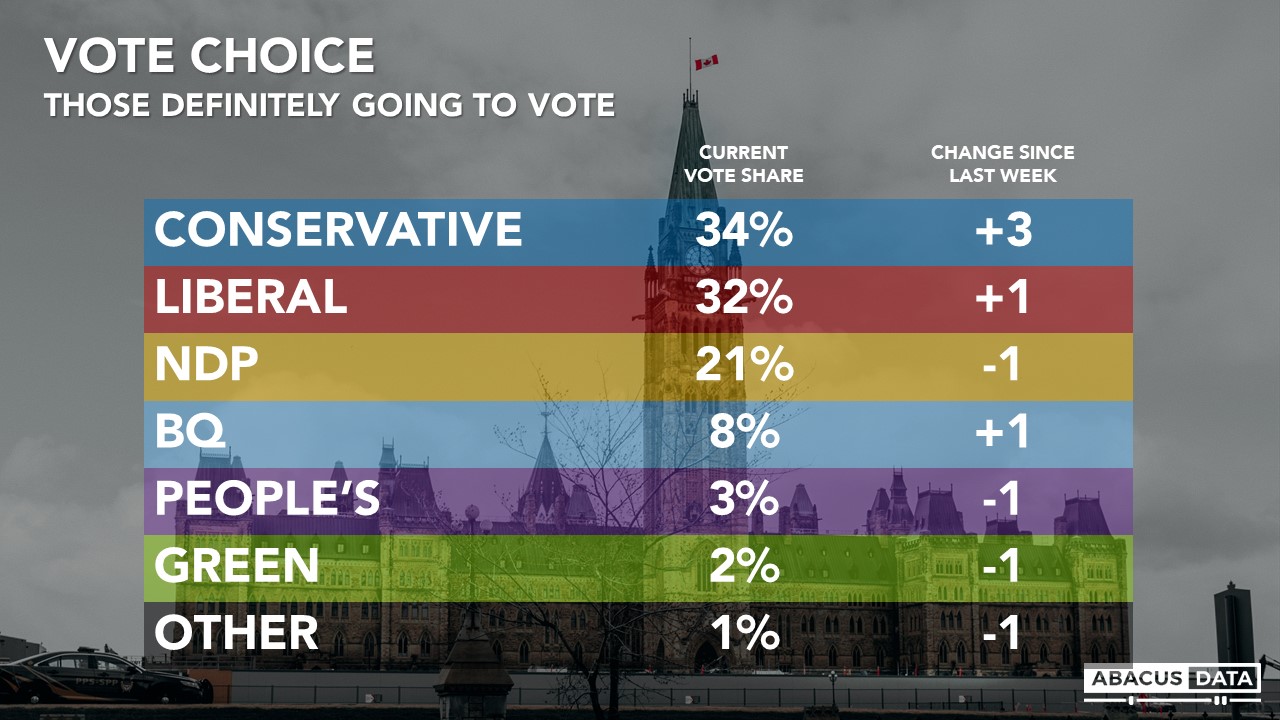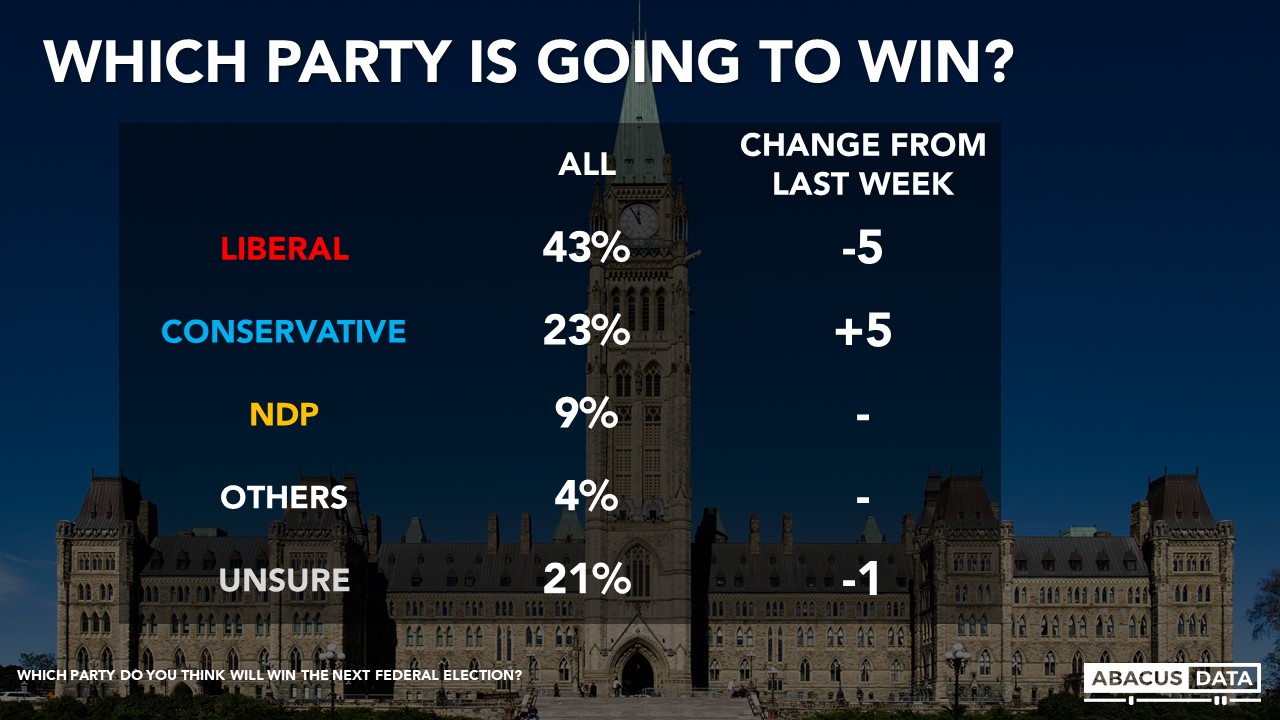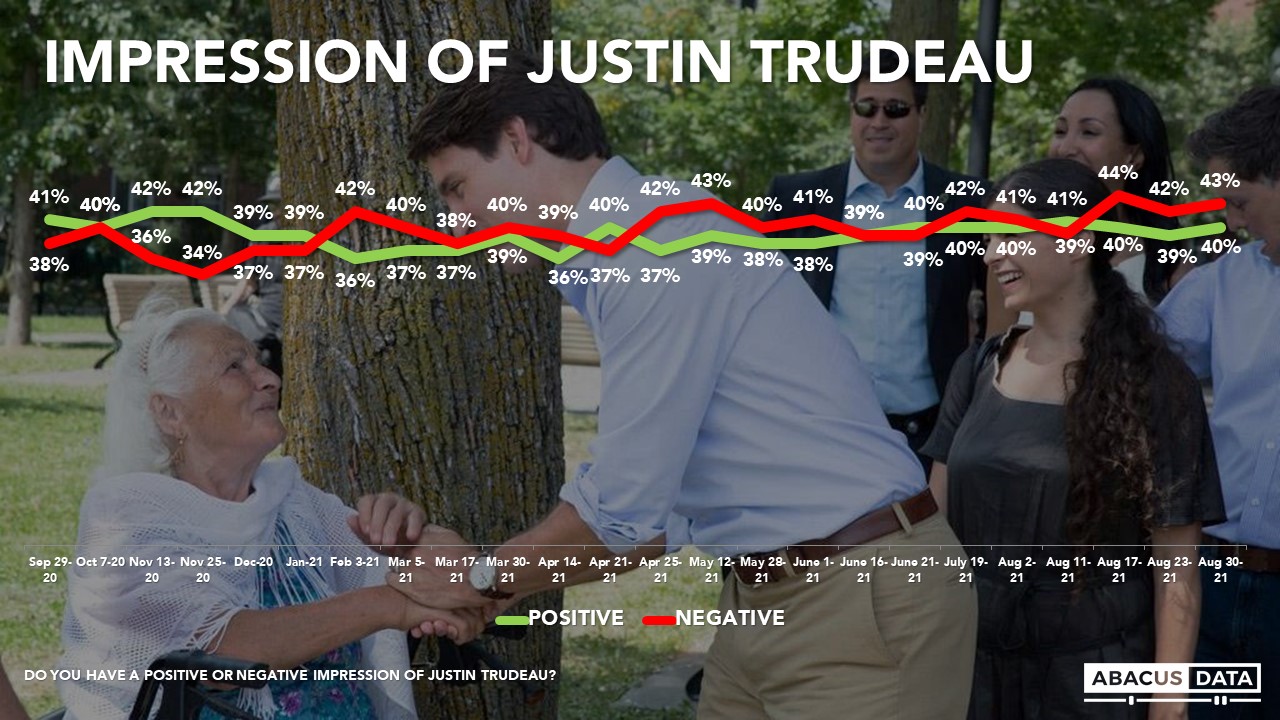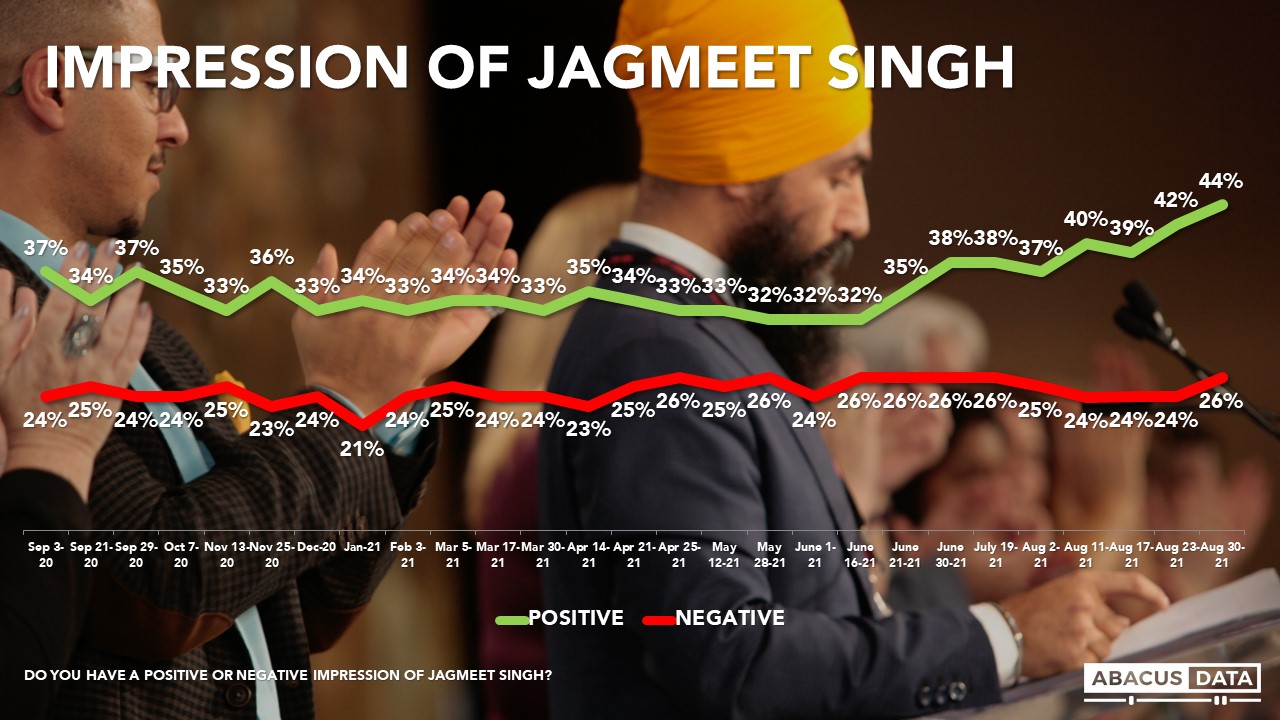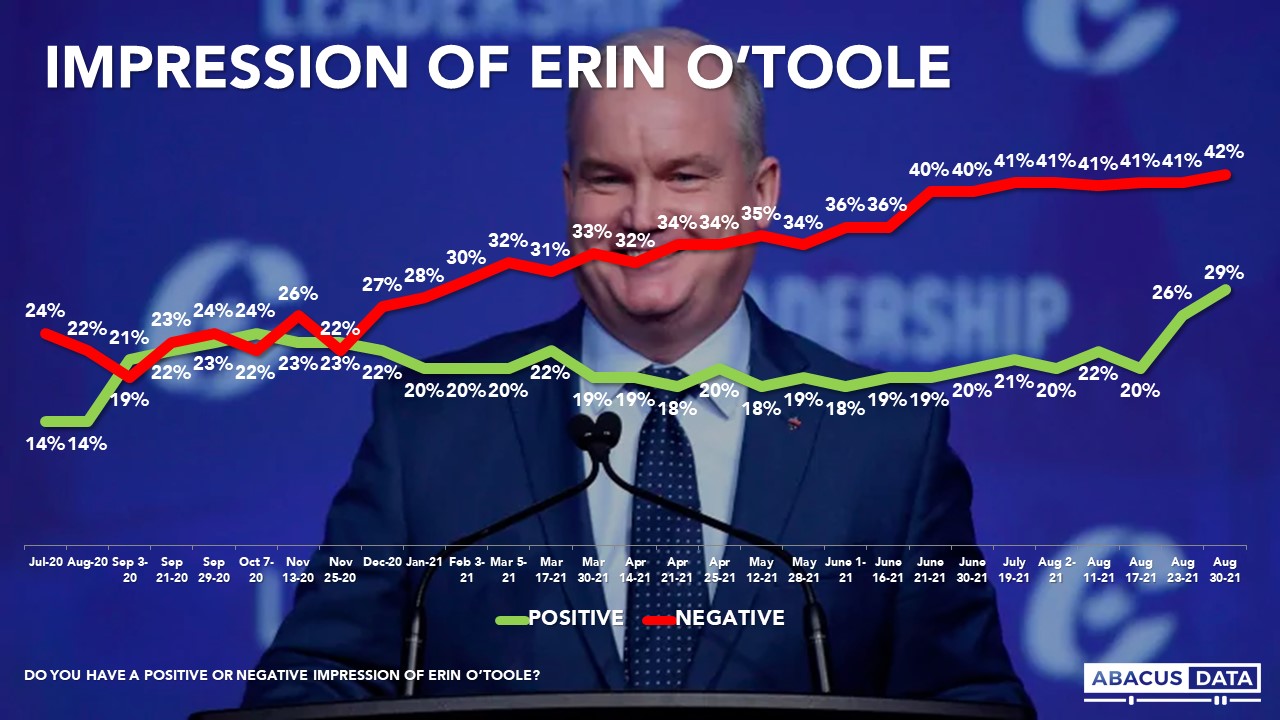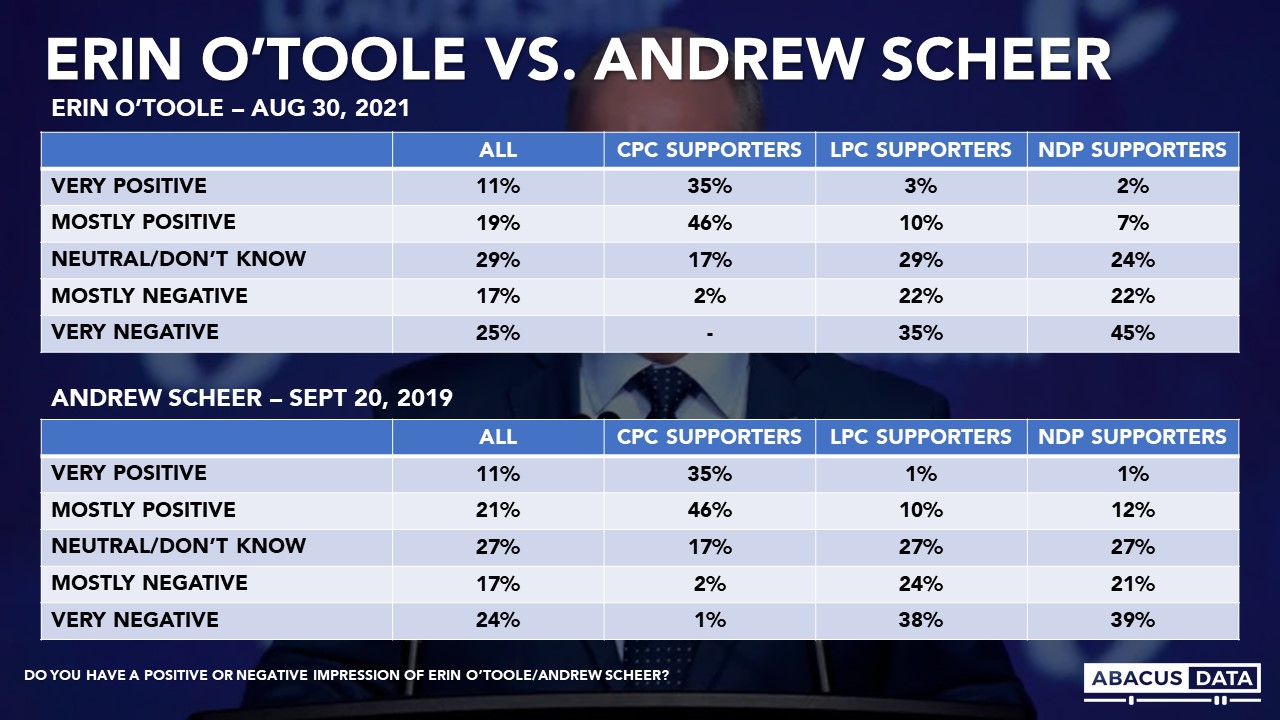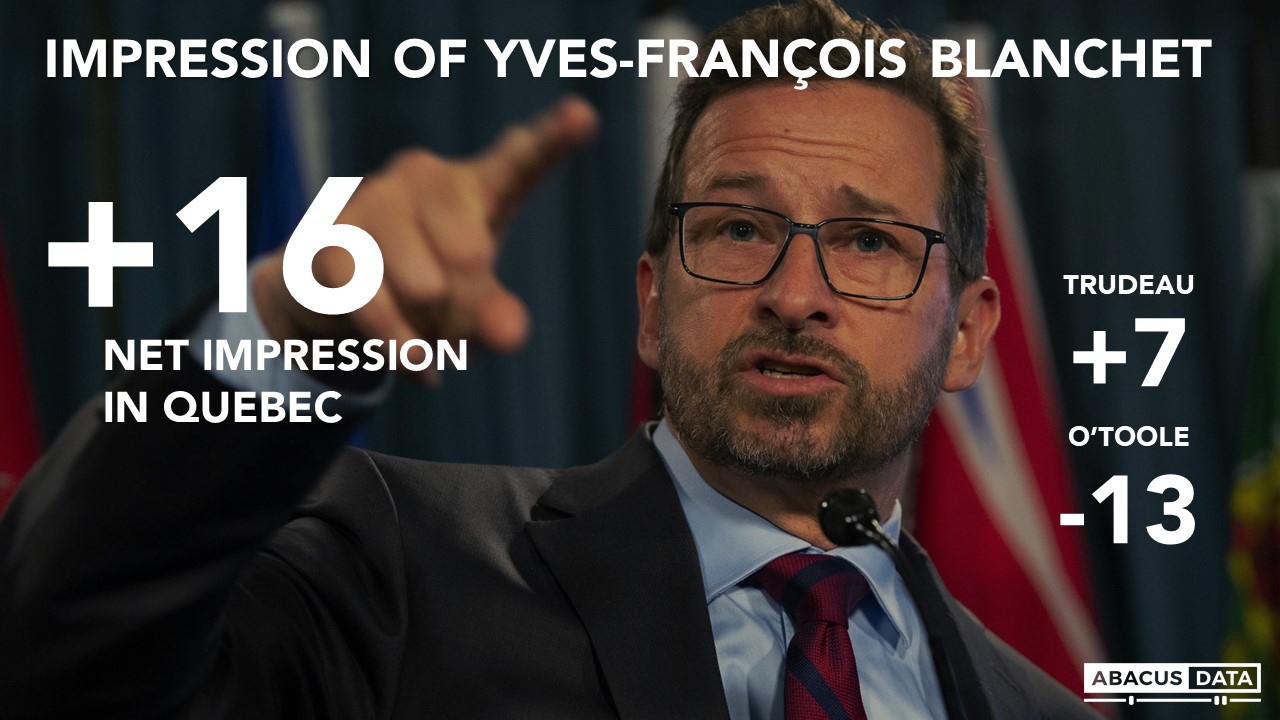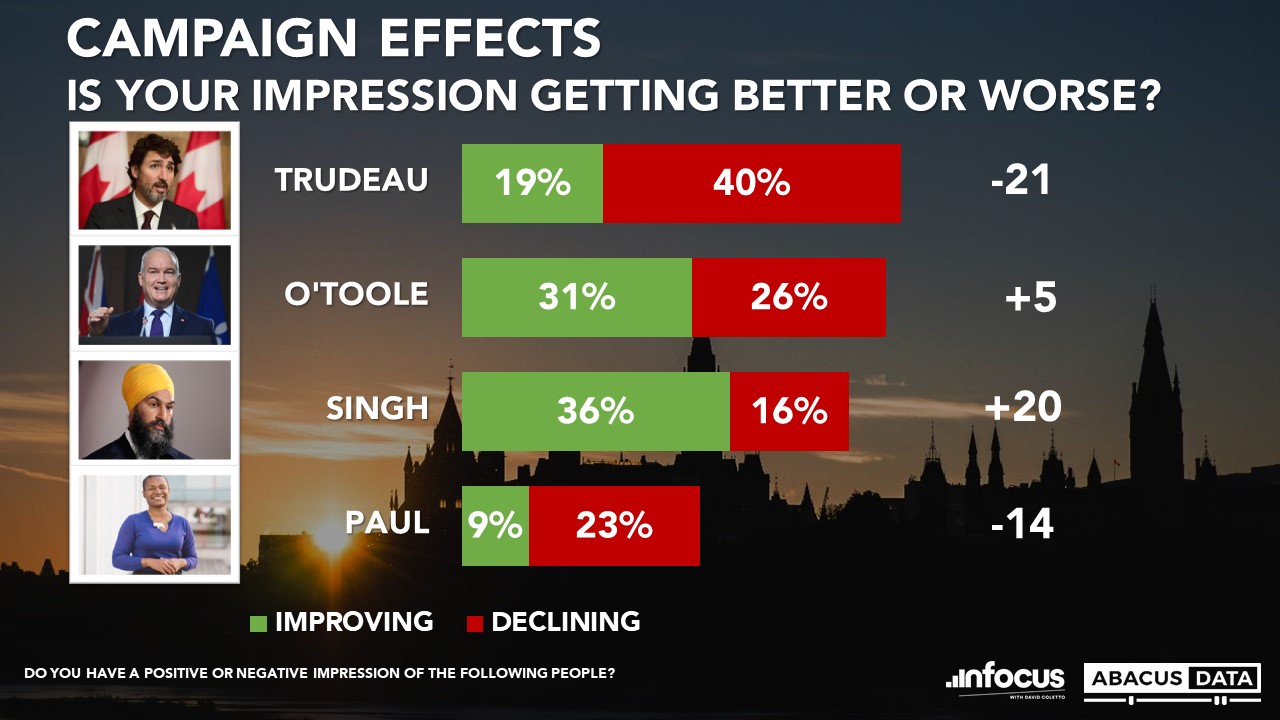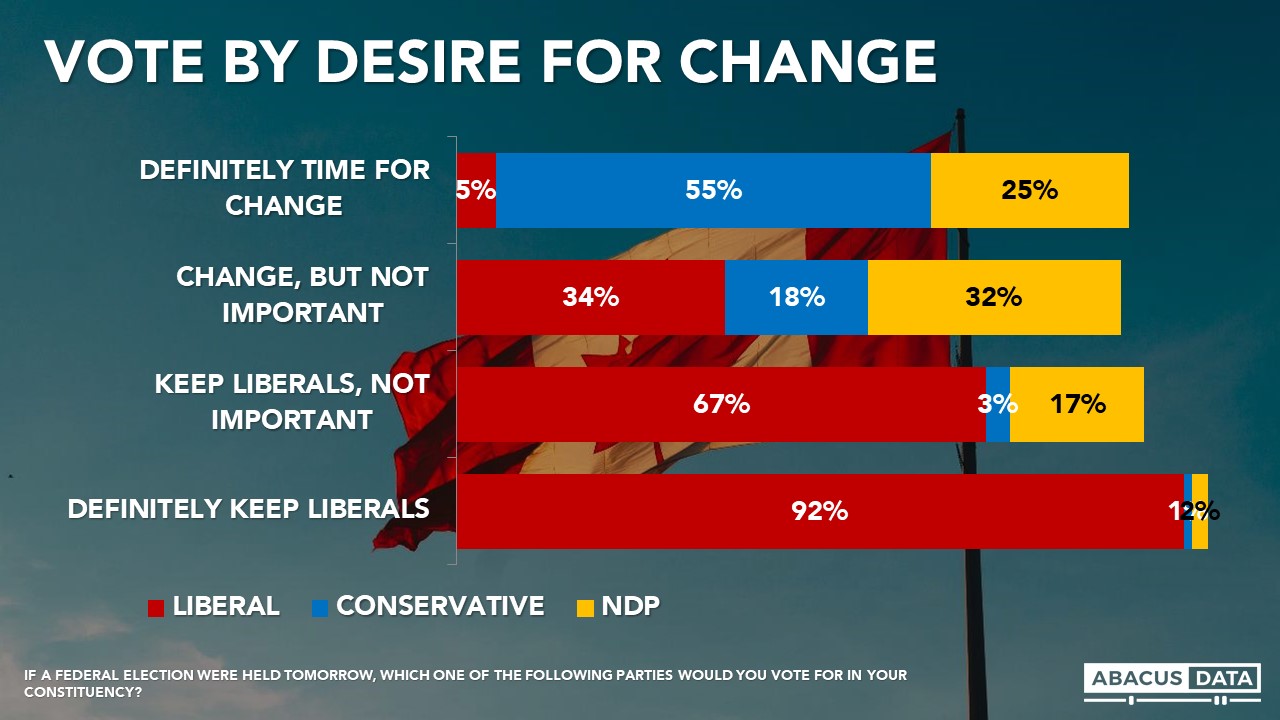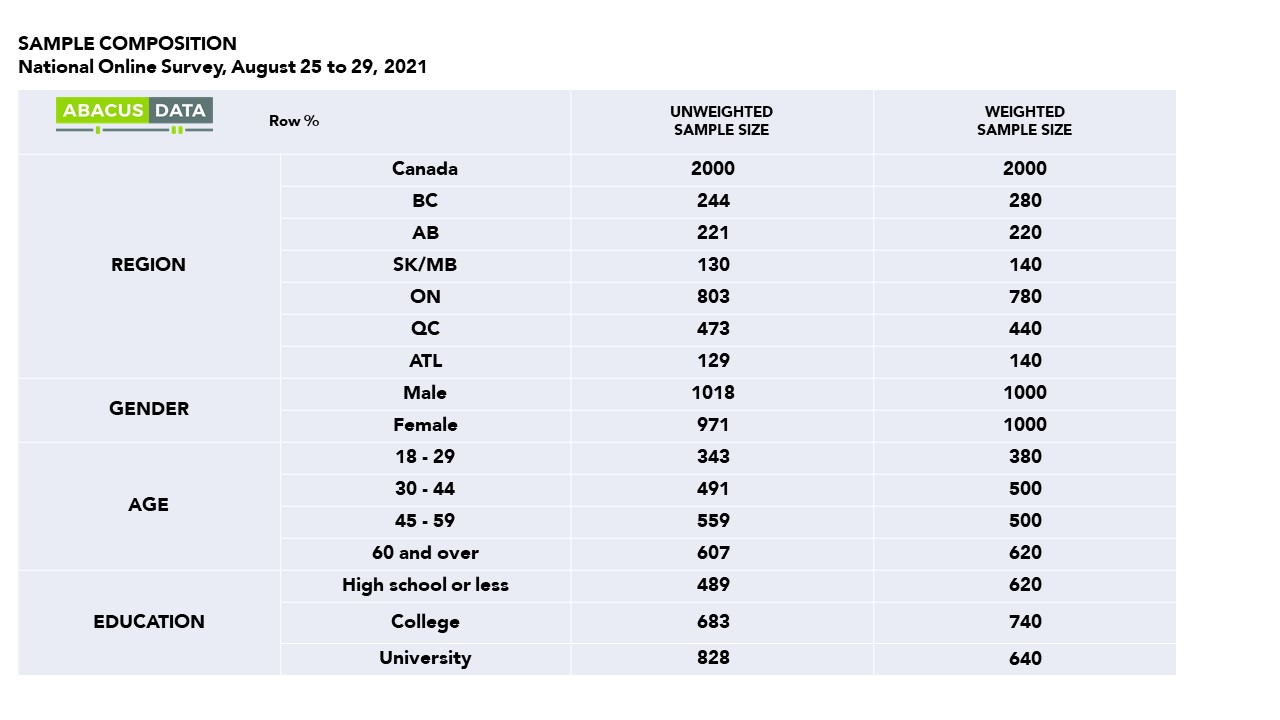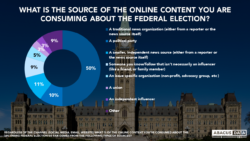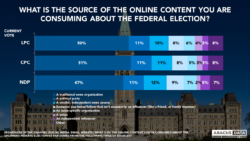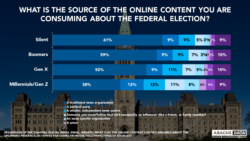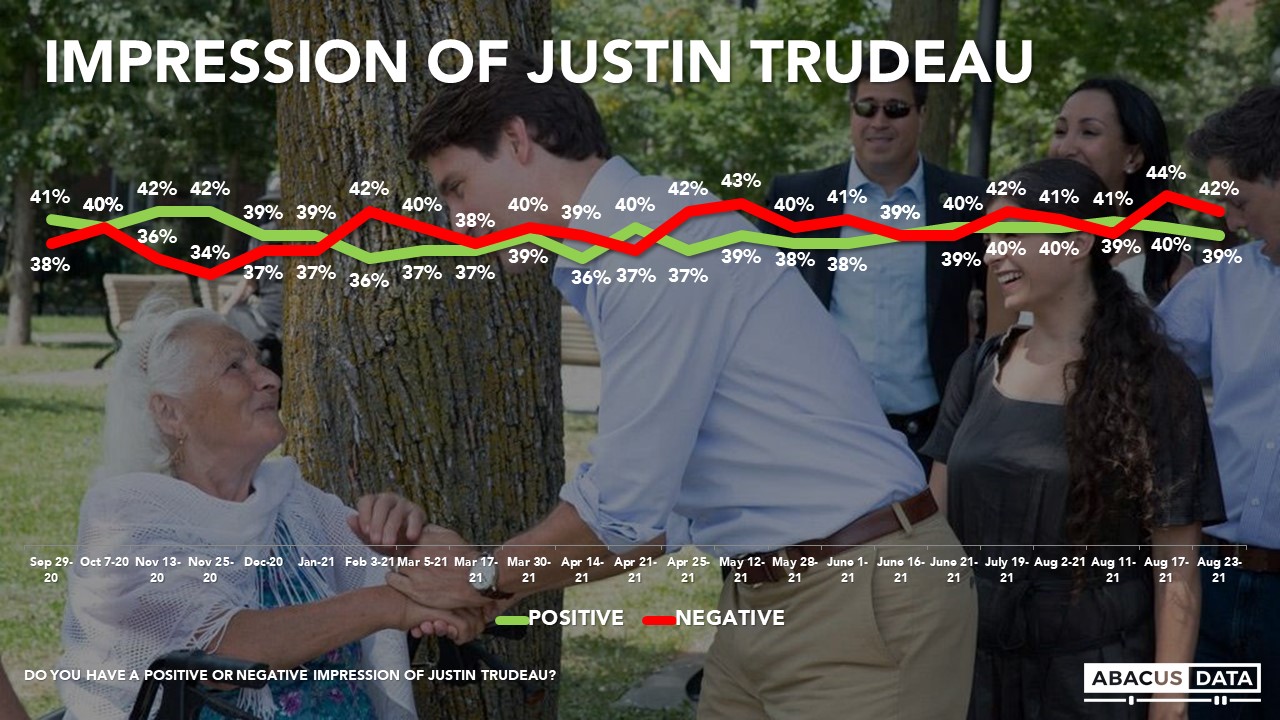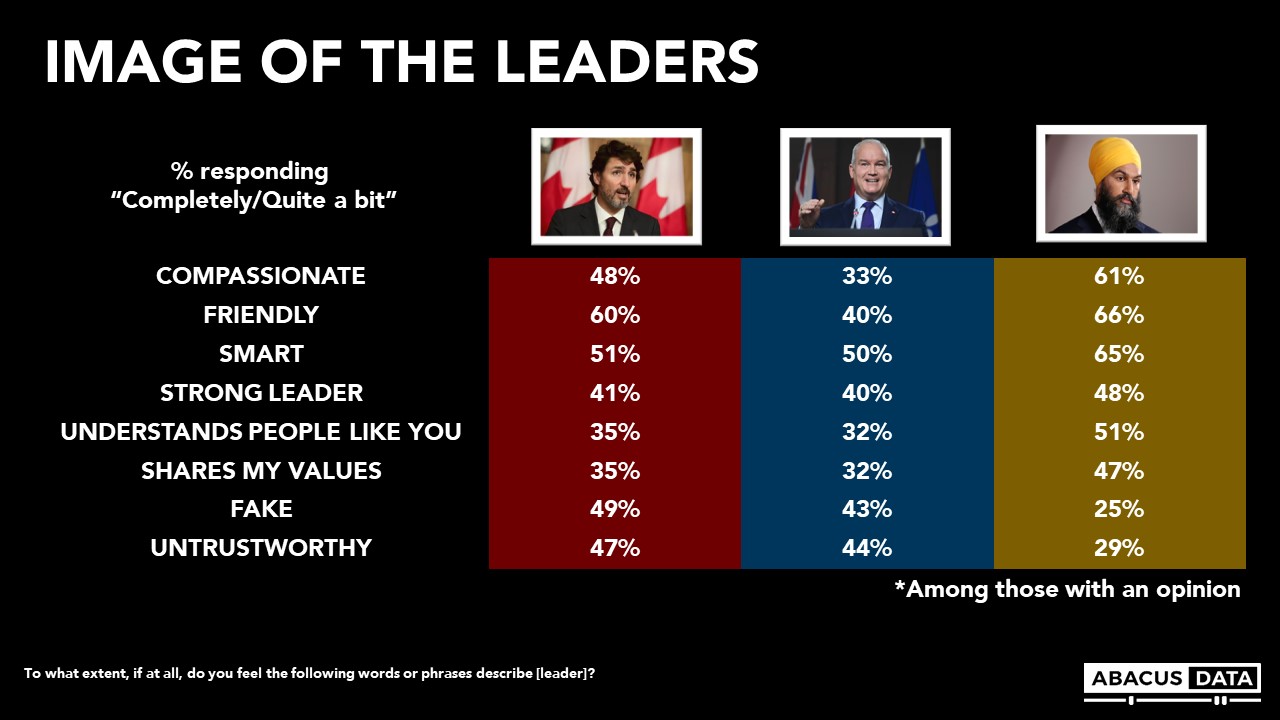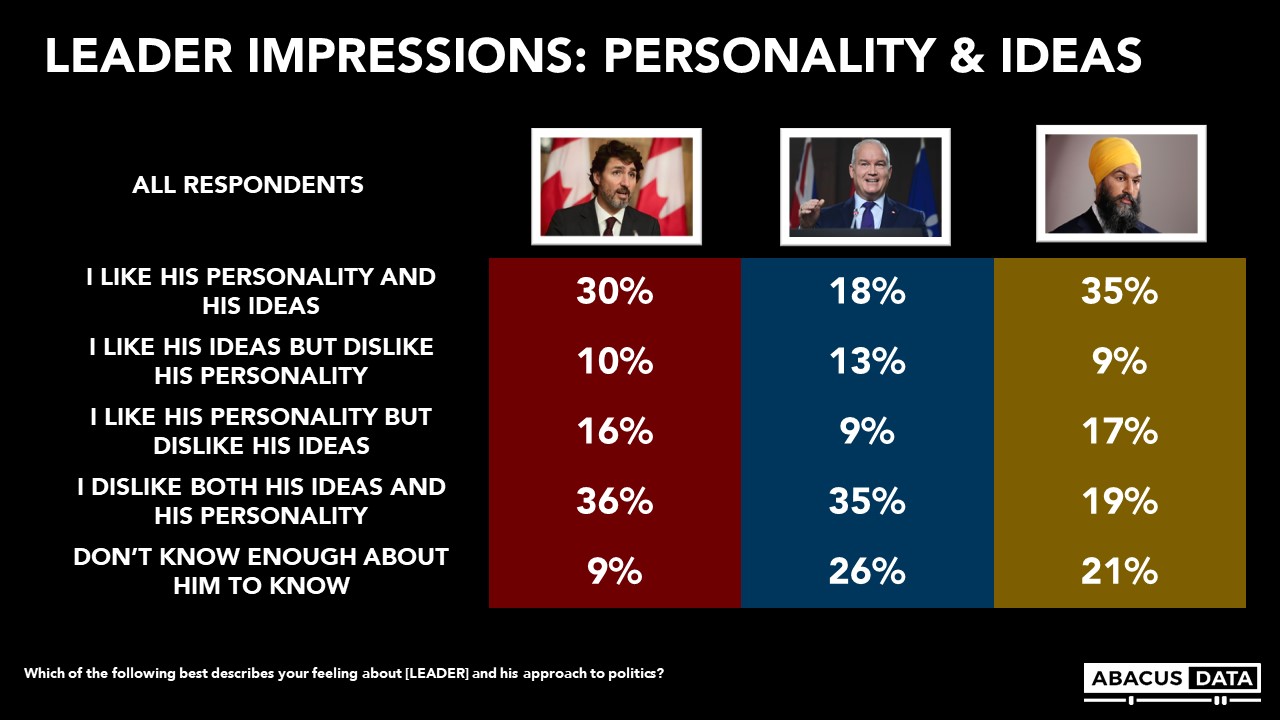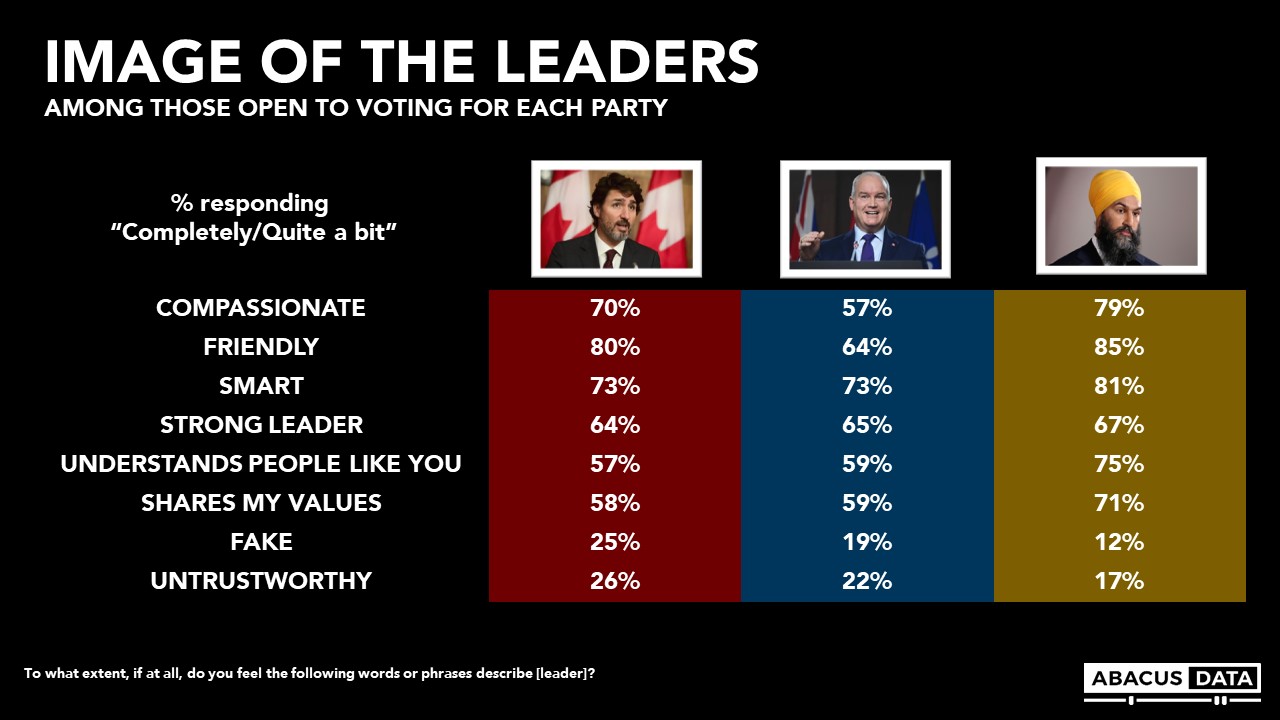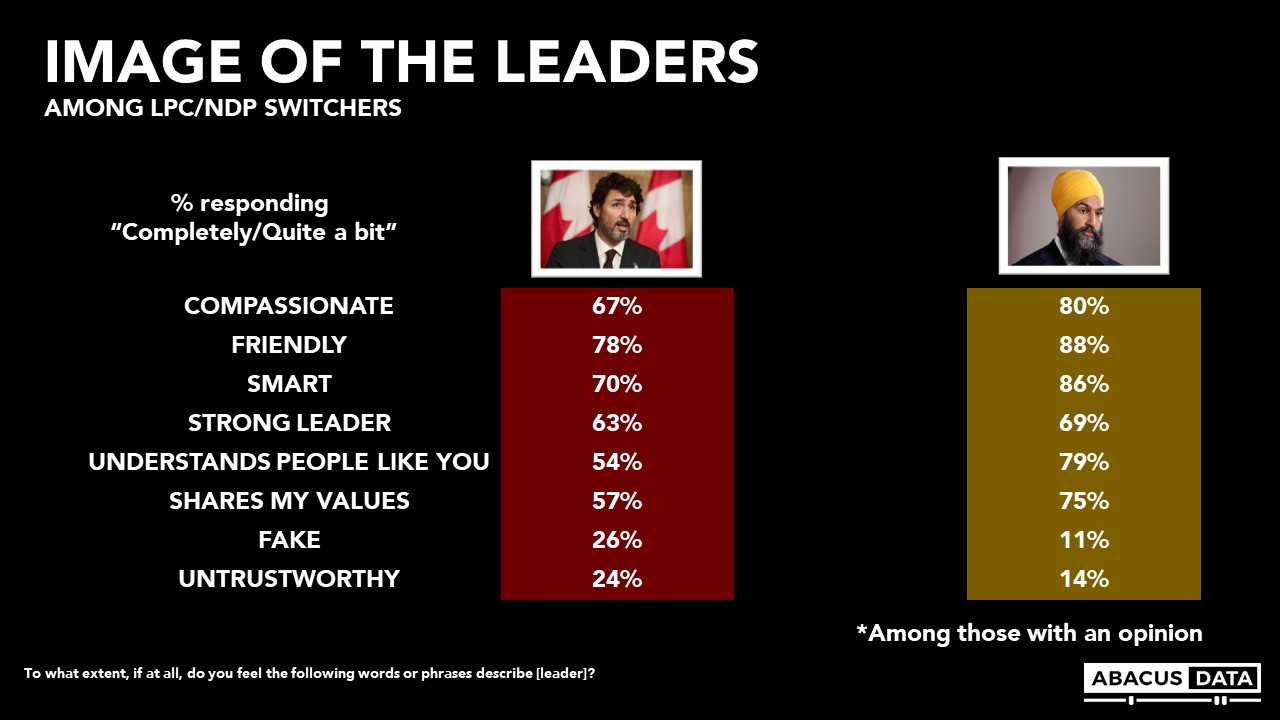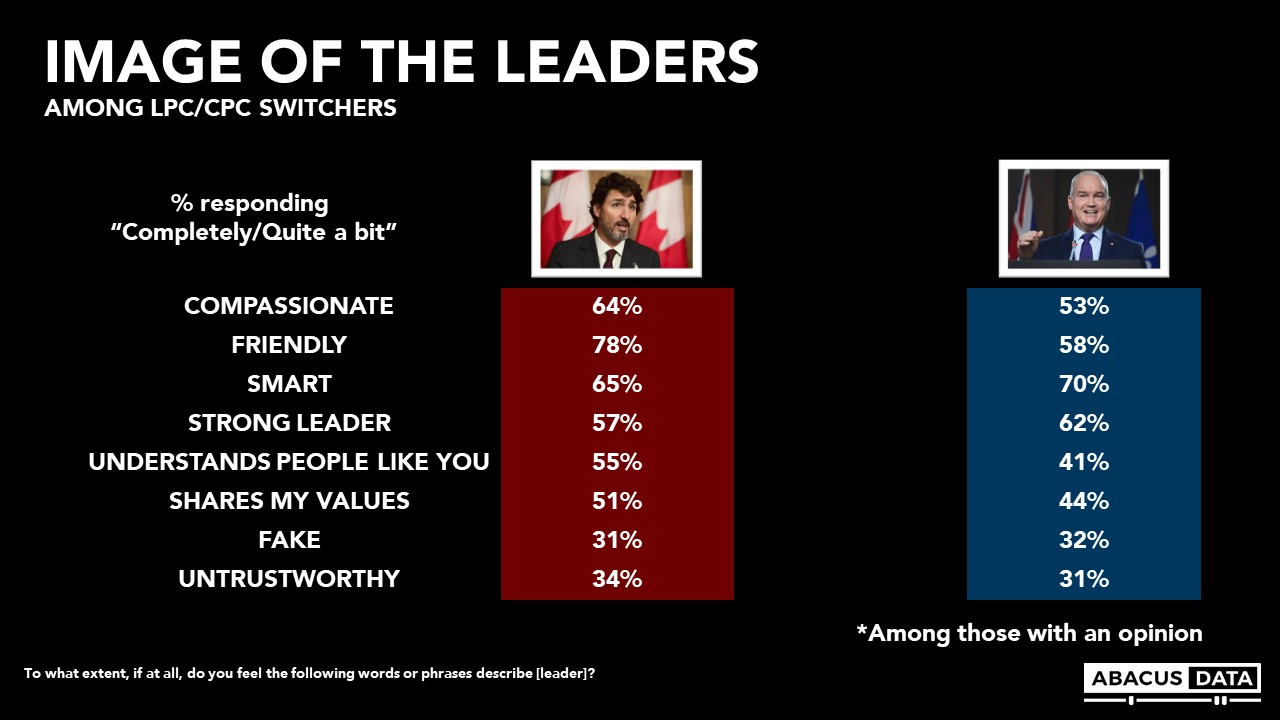16 Days to Go: A statistical tie between the Liberals and Conservatives as those thinking the Conservatives will win continues to rise
We just completed a national survey of 2,692 Canadians eligible to vote in the current federal election (September 1 to 4, 2021). 62% of the interviews were done after the TVA French-language debate on Thursday evening. We will have a new release out on Tuesday with a large sample to assess the TVA debate.
Here’s what we are seeing in our most recent survey:
If an election were held now, the Conservatives would win 33% of the vote (+1 from last week), the Liberals 32% (down 1), the NDP 21% (down 1), the Green Party 3% (up 1) and the BQ at 31% in Quebec (down 3)



• In BC, a three-way race with the NDP at 32%, the Liberals at 30%, and the Conservatives at 30% is very tight.
• In Alberta, 50% would vote Conservative compared with 24% for the Liberals, 19% for the NDP, 4% for the People’s Party and 1% for the Maverick Party.
• In Manitoba and Saskatchewan, the Conservatives lead with 53% followed by the Liberals at 21% and the NDP at 18%
• In Ontario, the Liberals and Conservatives are statistically tied (36% LPC vs. 35% CPC) with the NDP at 21%. Last week we had the Liberals ahead by 7 in Ontario.
• Within Ontario, the Liberals have a 23-point lead in the 416 region of Toronto, the Liberal and Conservatives are tied at 37% in the GTHA (postal codes start with L), the Liberals and Conservatives tied in Eastern Ontario while the Conservatives have a 17-point lead over the NDP in the Southwest.

• In Quebec, we see the BQ and LPC tied at 31% followed by the Conservatives at 18% and the NDP at 16%. When we compare the sample pre- and post-TVA debate, differences are within the margins of error. In our next release, we will have a larger sample of people who watched the debate and can report a clearer picture of how it might have affected attitudes.

• In the Atlantic provinces, the Liberals are ahead by 11 over the Conservatives (42% to 31%) with the NDP at 22%.
Although the Liberals and CPC are statistically tied among all decided respondents, the Conservatives continue to have a 3-point lead among those who are most likely to vote. Among the 69% of respondents who said they would definitely be voting, the Conservatives have 35% compared with 32% for the Liberals and 20% for the NDP. This is largely unchanged from last week.

TODAY VS. 2019: HOW WELL ARE PARTIES HOLDING THEIR VOTE.
The Conservatives are holding 87% of their 2019 vote, the rest has been scattered with no more than 4% going to any other party.
The Liberals have held 81% of their 2019 vote, losing 10% of that vote to the NDP and 6% to the Conservatives.
The NDP has held 83% of its 2019 vote, losing a bit more 7% to the Liberals than to the Conservatives (6%).
The Green Party has held on to just 48% of its 2019 vote, losing a quarter of its voters to the NDP, 11% to the Liberals and 11% to the Conservatives.

THE SWITCHERS
We continue to track two key groups in the electorate: LPC/NDP switchers (18% of the electorate) and LPC/CPC switchers (6% of the electorate). About half in both groups say they could still change their mind about how they will vote.
The Liberals continue to have a sizeable lead over the NDP among the LPC/NDP switchers with little change. However, among LPC/CPC switchers, we have seen a noticeable shift in favour of the Conservatives. This week, 53% of the LPC/CPC switchers would vote Conservative (up 12 points) while 47% would vote Liberal (down 12 points).

VOTE CERTAINTY
Today, 33% of those with a vote preference say their vote could still change (down 5 points in a week, and 7-points in two weeks. NDP and Green supporters are the most likely to be open to switching. Overall, 25% of Conservative supporters might change compared with 32% of Liberal voters, 25% of BQ supporters, and 46% of NDP voters.

PREFERRED OUTCOME
Asked which of four (most likely based on today’s numbers) outcomes they would prefer, 58% would prefer a Liberal victory (31% majority, 27% minority) while 44% would prefer a Conservative win (13% minority, 28% majority). Compared with last week, preference for a Liberal government is down 2-points, and over the past two weeks, it is down 5-points.
A Liberal win is the preference of 63% in BC, 44% in Alberta, 44% in Manitoba/Saskatchewan, 60% in Ontario, 65% in Quebec, and 59% in Atlantic Canada.
Among Liberal/NDP switchers 98% would prefer a Liberal to a Conservative victory. Among NDP voters 76% would prefer a Liberal win.
Among BQ voters 56% would prefer the Liberals win, compared to 44% who would like the Conservatives to come out on top.
Among Liberal/Conservative switchers two thirds (64%) would prefer to see the Liberals win.
EXPECTED ELECTION OUTCOME
As of today, 37% expect the Liberals to win (down 6 since last week), followed by 28% who expect the Conservatives to win (up 5), and 9% who expect the NDP to come out on top.

When asked whether the election will be close or will one party win by a lot, 70% think it will be close while 14% think one party will win by a lot. 16% are not sure.
Those who would prefer the LPC to win but think the Conservatives are going to win makes up 4% of the electorate – doubling from last week. Among this group, 43% would vote NDP, 33% Liberal and 12% Conservative. 9% would vote Green and 3% BQ.
LEADER IMPRESSIONS
Justin Trudeau enjoys a positive impression among 38% and negative impressions among 44%, for a net score of -6. This is unchanged from last week. Regionally, Mr. Trudeau’s net favourables are -5 in BC, -27 in Alberta, -33 in SK/MB, -2 in Ontario, 0 in Quebec, and +6 in Atlantic Canada. Among Liberal/NDP switchers Trudeau is +67. Among Liberal/Conservative switchers he is +43.

Jagmeet Singh enjoys a positive impression among 43% and finds negative impressions among 25% for a net score of +18.
Regionally, Mr. Singh’s net favourables are +31 in BC, +13 in AB, +9 in SK/MB, +33 in Ontario, +3 in Quebec, and +29 in Atlantic Canada. Among Liberal/NDP switchers Singh is +79.

Today 30% have a positive impression of the Conservative leader Erin O’Toole (+1 from last week) while his negatives are at 40% (-2) for a net score of -10, showing another week of gains.
Regionally, Mr. O’Toole’s net favourables are -17 in BC, +8 in AB, +6 in SK/MB, -8 in Ontario, -20 in Quebec, and -14 in Atlantic Canada. Among Liberal/Conservative switchers O’Toole is +48.

In Quebec, BQ Leader Mr. Blanchet is 42% positive and 30% negative (+5) for a net score of +12. In contrast, Mr. Trudeau is 0 and Mr. O’Toole is -20 in Quebec.

In terms of whether people’s views are improving or declining of the three main party leaders, we find Mr. Trudeau has the lowest momentum score while Mr. Singh has the highest.
• Justin Trudeau: 19% (unchanged) say their impressions are improving, 42% (+1) declining, for a momentum score of -23, similar to last week. Among LPC/NDP switchers, his momentum score is +7 and among LPC/CPC switchers it is -19 (a big swing from last week). Among those who voted Liberal in 2019, 22% say their impression of Mr. Trudeau has declined since the start of the campaign.
• Erin O’Toole: 31% say their impressions are improving (unchanged), 25% declining, for a momentum score of +6. Among LPC/CPC switchers, his momentum score is +39 (a marked difference from Mr. Trudeau). Among those who voted CPC in 2019, 6% say their impression of Mr. O’Toole has declined since the start of the campaign. Among 2019 LPC voters, 19% say their impression is improving.
• Jagmeet Singh: 35% (-1) say their impressions are improving, 16% declining (unchanged), and 48% not changing for a momentum score of +19. Among LPC/NDP switchers his momentum score is +55. Among those who voted NDP in 2019, his momentum score is +57.

DESIRE FOR CHANGE
The rise in the desire for change we were seeing in previous weeks has halted. Today, 48% definitely want to see a change in government (unchanged from last week) while another 23% say it would be good to have a change, but it is not really that important to them, for a total of 71% who would prefer a change in government. This outlook is almost identical to the feelings we measured in the run up to the 2019 election.

The vote preference by change group is important to understanding the election. Among those who say they want change but it isn’t important (23% of the electorate at the moment), the Liberals and NDP are statistically tied (NDP 34% vs. LPC 32%) with the Conservatives in third. As long as the Liberals can win a large share of this group, they can be re-elected.
But if those in this group migrate up to “definitely want change”, it’s far less likely they will vote Liberal. As perceptions about the competitiveness of the election shift, the split in these groups could also change.

PREFERRED PRIME MINISTER
Today, 36% of voters would prefer Justin Trudeau be PM after the election, 32% would prefer Erin O’Toole, and 25% Jagmeet Singh. This is the exact same split as last week.

In BC, 34% would prefer Singh and 33% Trudeau, followed by O’Toole at 29%. In Ontario, Trudeau is preferred by 37% followed by O’Toole (31%) and Singh (21%). In Quebec, Trudeau is well ahead of O’Toole (42% to 28%) followed by Singh at 21%.
Asked if the choice was only between O’Toole and Trudeau, Trudeau would be the preference of 56% (down 2) and O’Toole 44% (up 2). When asking who they would prefer between Mr. O’Toole and Mr. Singh, the split is almost the same, 55% would prefer Mr. Singh and 45% would prefer Mr. O’Toole.
UPSHOT
According to Bruce Anderson: Today’s results would probably produce a very similar House of Commons to the one which was just dissolved. But it is very unlikely that there will be no movement in the next 16 days as more debates and more advertising kick in. There are two groups to watch in my view.
• The 23% who want change but who don’t feel that strongly about it – if a third of them vote NDP as they currently intend to do, then the Liberals could be defeated by the Conservatives on Election Day.
• The 18% who say they will either vote Liberal or NDP, among whom 45% say they will currently vote NDP, but among whom 98% prefer the Liberals to win over the Conservatives. As three of four NDP voters prefer a Liberal government they likely hold the key to whether the country will elect one on September 20.
The campaign has gone well for Erin O’Toole personally and he has improved his party’s chances. With debates beginning and advertising becoming more plentiful and more pointed, the level of scrutiny about a Conservative victory and what it means will be higher and more persistent, especially as Canadians think it is more possible.
NDP-leaning progressive voters will likely be attentive to what a Conservative government could mean for issues ranging from climate change and pipelines to guns to childcare to health care and vaccinations.
With almost 10 million voters saying their current preference isn’t locked in, the election trajectory is far from certain and the outcome unpredictable.
According to David Coletto: “We continue to see only slight changes in vote intention and impressions on most metrics we track as week three of the campaign comes to a close. The Conservatives and Liberals remain statistically tied although the Conservatives have a slight lead among those most likely to vote. Impressions of the leaders haven’t changed much since last week.
However, we are seeing some important shifts in other perceptions. For example, far more people today believe the Conservatives will win the election. More still think the Liberals will win but the gap has closed substantially over the past three weeks.
The Conservatives are making some gains among Liberal/Conservative switchers, but they haven’t fundamentally altered the electorate. Those open to voting Conservative is stuck at 44%, the same as last week. And so, while the Conservative campaign has been successful in re-engaging its 2019 coalition, I don’t see any evidence yet that it is expanding its audience and building a coalition that can win the election outright.
The Liberal vote share has been stuck in the low 30s now for three straight weeks. Mr. Trudeau’s negatives are rising slowly but importantly for the Liberals, the desire for change has halted its weekly rise in our tracking. Right now, more people still would prefer Mr. Trudeau as prime minister over Mr. O’Toole but that margin has shrunk somewhat from last week.
And finally, while Mr. Singh continues to have the best net impression among the national leaders, the NDP vote is stuck in the low 20s. In fact, it seems to have reversed gains made earlier. There’s still a lot of people who say they are open to voting NDP (48%) but converting them beyond 20-22% seems to be a challenge. The biggest risk for the NDP remains the threat of strategic voting, especially as more and more people come to realize that the Conservatives are able to win the election.
So far, the TVA leaders’ debate doesn’t seem to have fundamentally altered the race in Quebec but we will have more to say on that on Tuesday.”
METHODOLOGY
The survey was conducted with 2,692 Canadian adults eligible to vote from September 1 to 4, 2021. A random sample of panelists were invited to complete the survey from a set of partner panels based on the Lucid exchange platform. These partners are typically double opt-in survey panels, blended to manage out potential skews in the data from a single source.
The margin of error for a comparable probability-based random sample of the same size is +/-1.9%, 19 times out of 20.
The data were weighted according to census data to ensure that the sample matched Canada’s population according to age, gender, educational attainment, and region. Totals may not add up to 100 due to rounding.
This survey was paid for by Abacus Data Inc.
Abacus Data follows the CRIC Public Opinion Research Standards and Disclosure Requirements that can be found here: https://
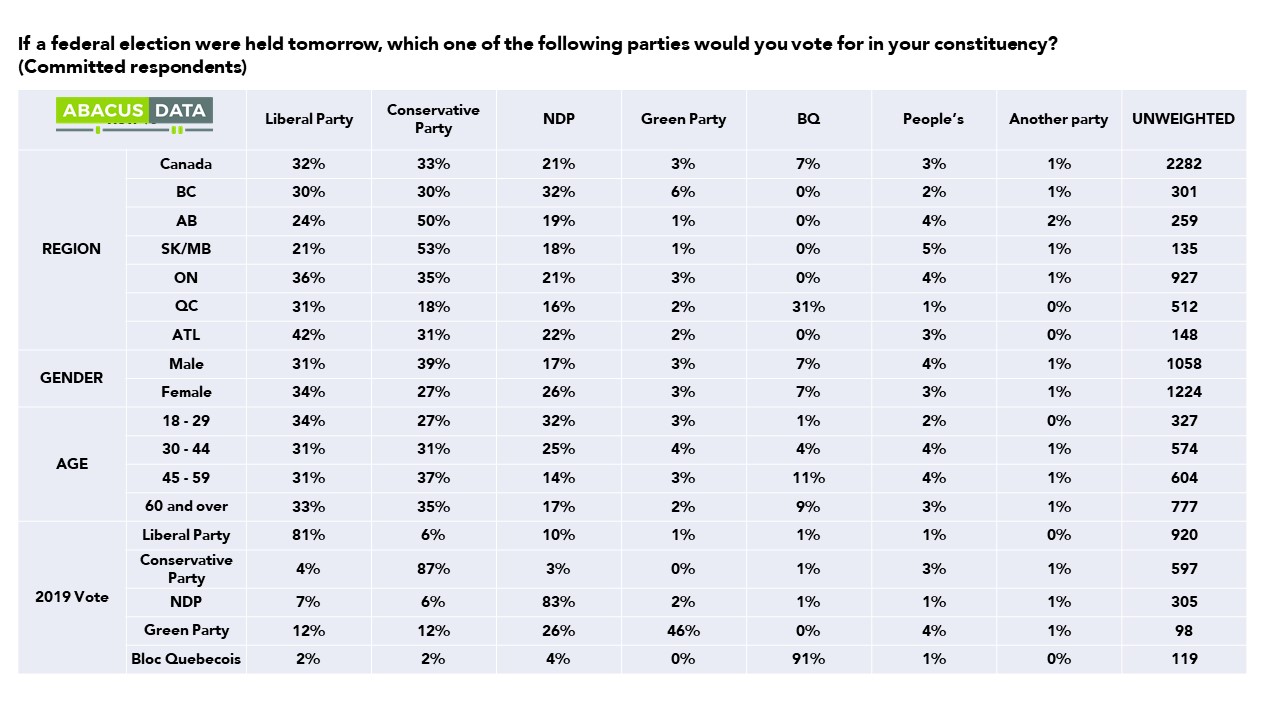
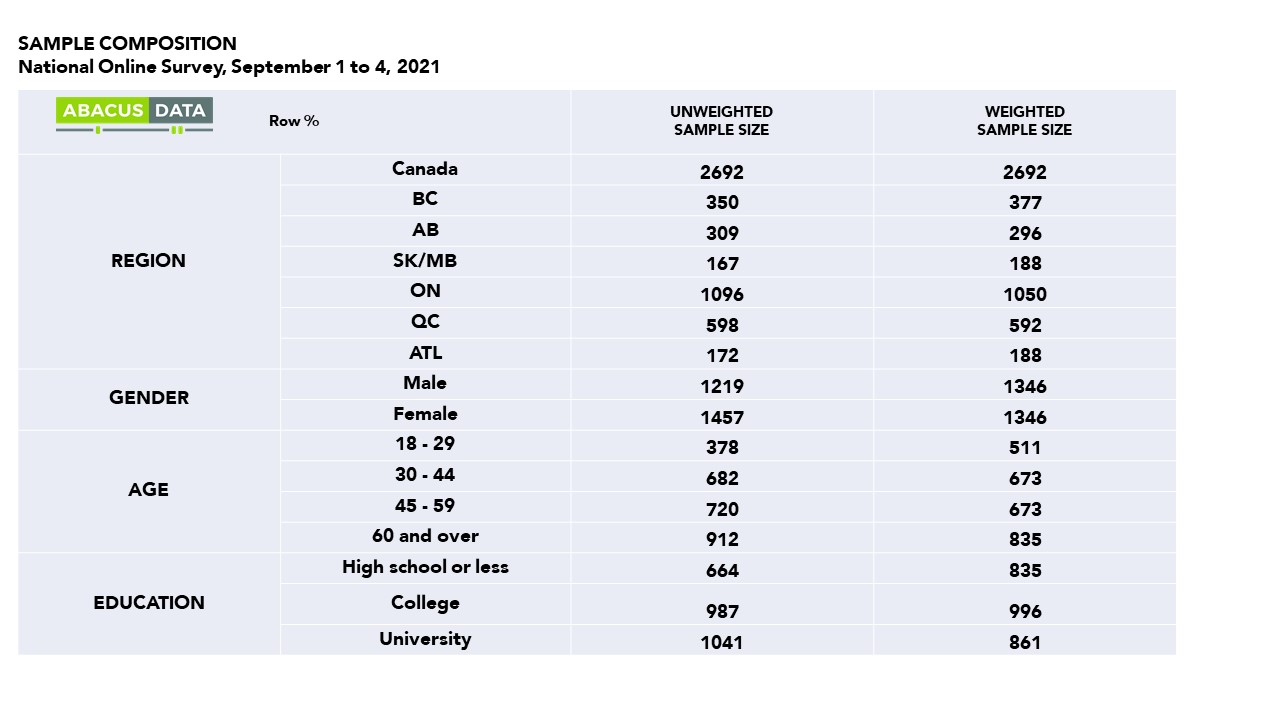
ABOUT ABACUS DATA
We are the only research and strategy firm that helps organizations respond to the disruptive risks and opportunities in a world where demographics and technology are changing more quickly than ever.
We are an innovative, fast-growing public opinion and marketing research consultancy. We use the latest technology, sound science, and deep experience to generate top-flight research-based advice to our clients. We offer global research capacity with a strong focus on customer service, attention to detail and exceptional value.
We were one of the most accurate pollsters conducting research during the 2019 Canadian Election.
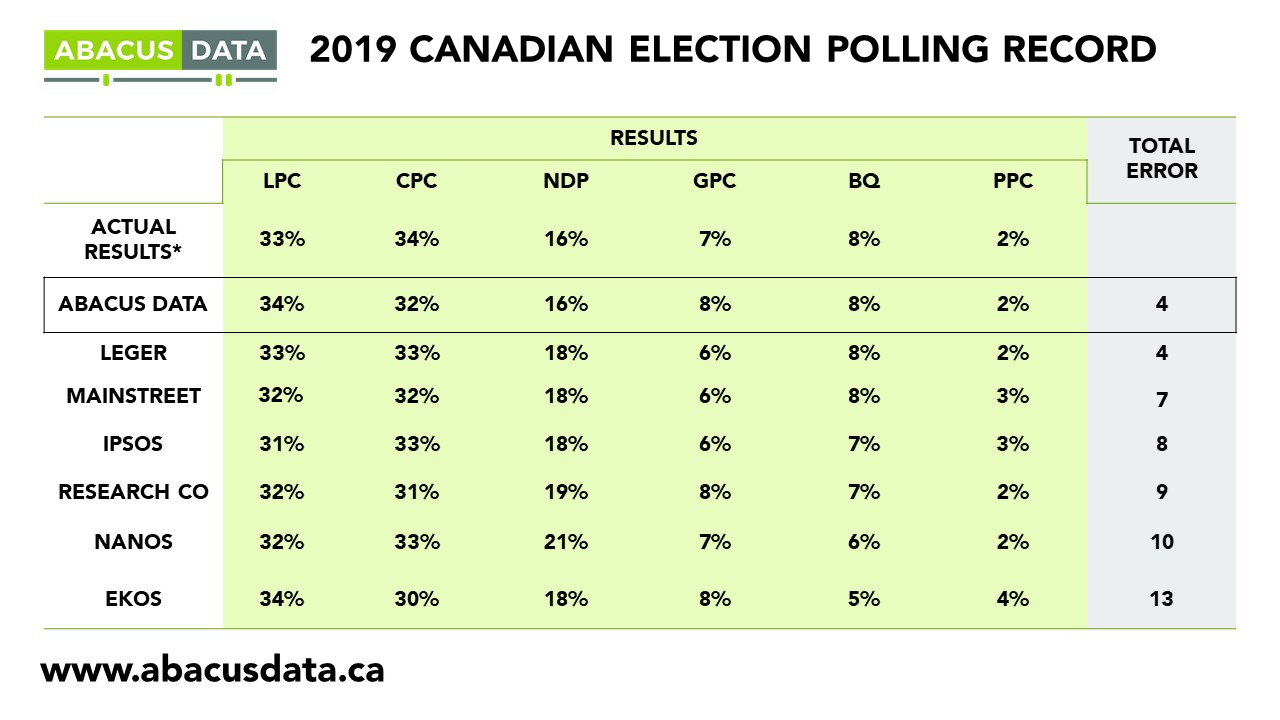
Contact us with any questions.
Find out more about how we can help your organization by downloading our corporate profile and service offering.

